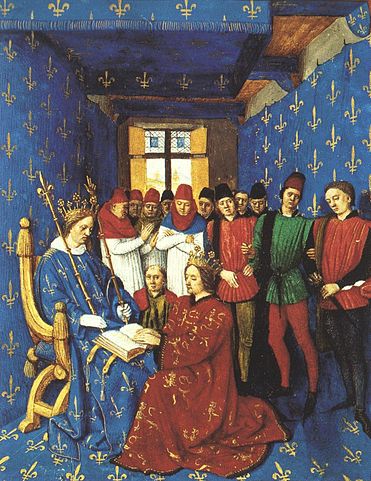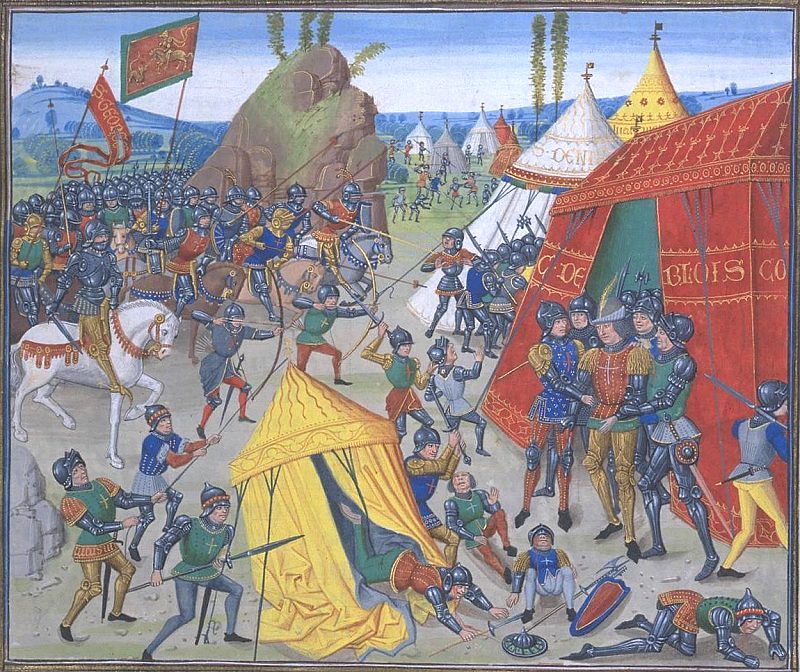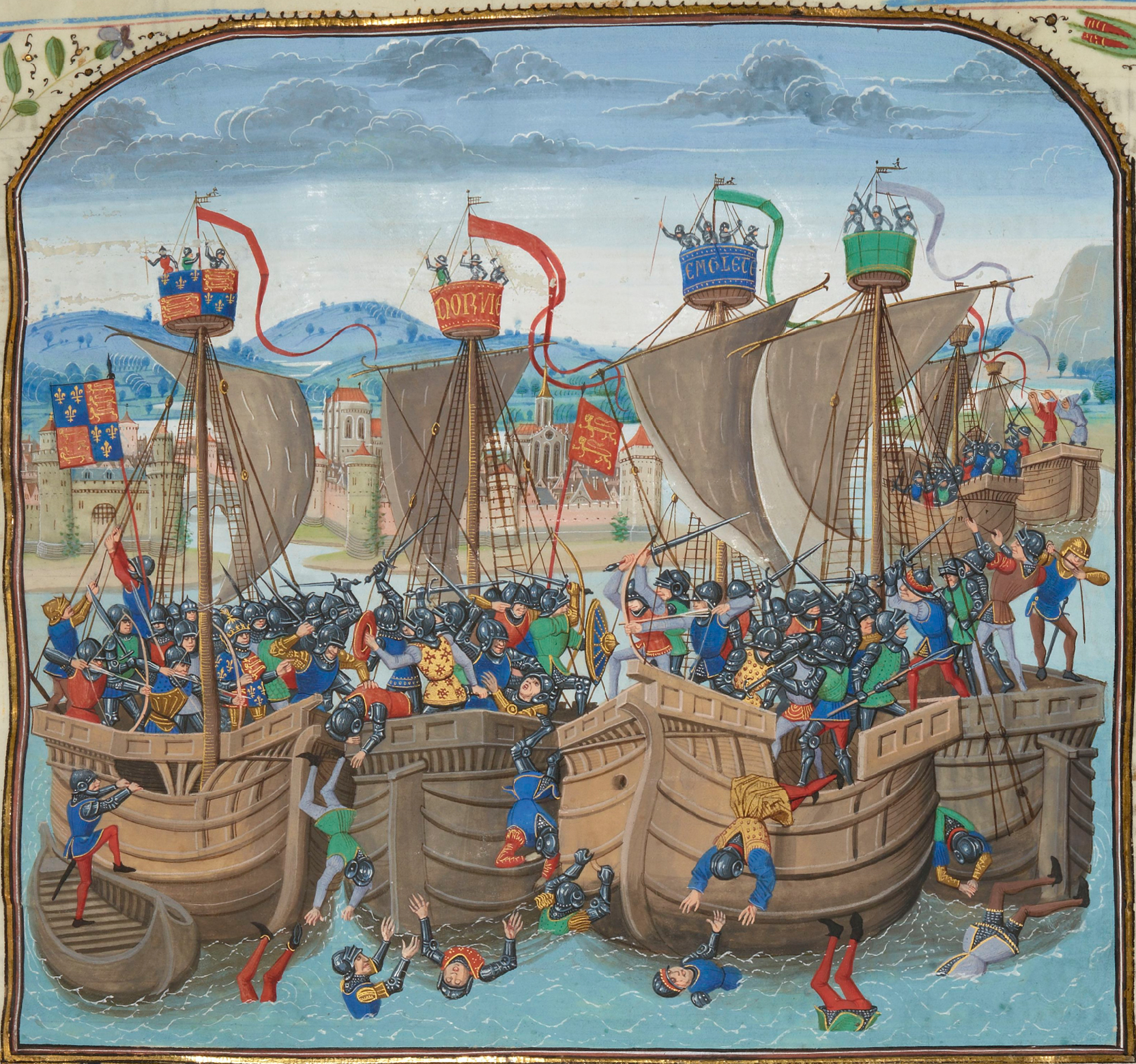Childhood
 |
| Broons |
A future Constable
of France, Bertrand du Guesclin was born in a remote manor in
Brittany[i] in 1320[ii]. Bertrand was the oldest
of the ten children[iii]
of Robert, lord of Broons; very minor nobility. His mother,
Jeanne de Malmains, was an heiress and connected to a couple of more senior
noble families. The child was swarthy and in the Chanson de Bertrand[iv], Bertrand was described thus;
‘There was none so ugly from
Rennes to Dinan,
Flat-nosed and dark, gross
and uncouth…
His father and mother so
hated him
That often in their hearts
they wished
That he were dead or drowned
in a running stream:
Lout they called him, and
stupid and ugly.’[v]
The Chanson
describes an incident when the six year old Bertrand is upstaged by his younger
siblings at a family feast; the eldest child being sat at a side table on his
own. Enter a wandering nun at stage left, who prophesies that Bertrand’s name
will be known across the European stage. None of the Chanson’s details of
Bertrand’s early life can be taken at face value.  |
| Broceliande |
The Chanson
alleges that Bertrand took forty or so boys of his father’s tenants, setting
them to fight in mock tournaments. Robert du Guesclin ordered that his tenants
stop their children playing with his son; failure to do so would result in a
fine of 100 sous. This apparently did not stop Bertrand picking fights with
stray children. To stop even this de Guesclin père shut his son in a tower;
this sounds like a typical fairy tale; the author of the Chanson perhaps drawing
on the tales of Brocéliande[vi].
Leaving Home
At the age
of seventeen Bertrand was sent to live with his uncle Bertrand and his wife in
Rennes. Normally sons of the nobility were sent away at an early age to acquire
skills away from home; during this period seventeen was old to leave home. But
according to the Chanson Bertrand’s behaviour had not improved; he crept out of
church and ran off to join a peasant wrestling contest. His aunt read Bertrand
a sermon upon his return home;
‘You are not holding your
rank as the son of a knight…..
It would be much better to
amuse yourself
By following contests, jousts and tourneys.’[vii]
This
suggestion appealed to Bertrand and, with his parent’s permission, he started
to attend the tourneys; although his father asked that he not be allowed to
joust. The Chanson suggests that Bertrand was stealing from his parents and
selling the horses he had been given to pay his way. The young man was becoming
known for his profligacy;
‘By Bertrand Glaiequin wines
were offered
All welcomed him, all feted him.’[viii]
A Good Time to be a Knight |
| Edward III pays homage to Philip VI |
Bertrand
came of age as a monumental war began in 1337, the One Hundred Years War[ix]; he was long dead before the final
ramifications of Edward III’s invasion of France were dealt with.
The huge Angevin empire[x] ruled over by the Kings of
England, who gave homage in part for their lands in France to the French king,
gave the English a slender claim to the French throne; a claim hotly disputed
by their French overlord[xi].
The French
and the English were hereditary enemies and slights were magnified and brooded
over for generations. The question of the French succession was aggravated by
issues over the Flemish wool trade and the relations between England’s two
major enemies, France and Scotland[xii].
In 1328 the
last of the French Capetian monarchs Charles IV died, leaving no direct heir. The
French barons selected the king’s cousin Philip VI as the most appropriate alternative to Isabella, Charles’ sister, and her son Edward king of England[xiii]. Within the year Edward
had crossed the channel to pay homage for his possessions in France.
‘It is hardly necessary to
say that King Philip received the young King of England with all honour and
dignity, and so did all the kings, dukes and counts who were present there…..I
believe that King Edward paid homage with words and a kiss only, without
putting his hands between the hands of the King of France.’[xiv]
The
immediate cause of the war came in 1336, when Edward was apparently about to
conclude his war with Scotland. Philip had his fleet transfer from the
Mediterranean to a base in Normandy. Edward and his advisers believed this was
a preliminary to an invasion of England and from that point on war was
inevitable.
War in Brittany
 |
| Funeral of Jean III |
The death of
Duke Jean III[xv] led to a civil war in Brittany; some nobles supporting Joan of Dreux[xvi] the niece to whom Jean III had left
his inheritance; and the rival faction supporting Jean IV[xvii], Jean III’s half brother. When the
dukedom was awarded to Joan; Jean turned to Edward for support. The two
candidates’ supporters were mostly drawn up on geographical and cultural lines;
the western districts supporting de Montfort and the eastern ones supporting
Joan.
Bertrand’s
brother Robert initially supported Jean as duke, only joining Joan’s faction in
1344. Bertrand was present at the first siege of Rennes by the English in 1342,
according to Friossart,
who mentions Bertrand as a squire, along with a friend Yvain Charruel.
The Chanson
de Bertrand tells of the capture of Fougeray[xviii]; a castle in English hands. Cuvelier states
that Bertrand and sixty men captured the castle by cunning; a small group,
disguised as woodcutters, captured the gate and opened them for the remaining
partisans to overwhelm the remnants of the garrison, the main contingent of
whom had ridden off to aid besieged comrades at Auray. Bertrand informed the
English;
‘Sons of whores, you will
pay it dear
The bath I’ll warm for you,
Tis a bath of your blood
I’ll draw for you.’[xix]
This action
brought Bertrand to the attention of Charles of Blois[xx].
This civil war
gave Bertrand the chance to learn the tricks of his trade; learning to fight
‘In the service of Charles
of Blois, becoming skilled in the tactics of ambush and ruse, the use of
disguise, spies and secret messengers, smoke clouds to hide movements, bribes
of money and wine, torture and killing of prisoners, and surprise attacks
launched during the “Truce
of God”.’[xxi]
 |
| Battle of Roche-Derrien |
Jean de
Montfort died in September 1345; his son being made a ward of Edward’s. Control
of the fight was handed over to a succession of lieutenants, waging war against
the French by proxy. Charles of Blois was taken prisoner at the battle of la Roche-Derrien in June 1347 and committed to the Tower of London.
A Death Blow
The French
had already suffered two major setbacks in the early years of the overarching
war between Edward and Philip; the crushing of the French navy at the battle of Sluys in June 1340 and six years later the destruction of the army
at Crécy in August 1346. In July 1347 Philip
agreed a one year truce.
 |
| Battle of Sluys |
The
following year an even more overwhelming disaster reduced the French defences;
the arrival of the Black Death[xxii].
‘Death coming into our midst
like black smoke, a plague which cuts off the young. A rootless phantom which
has no mercy for fair countenance. Woe is me of the shilling in the armpit! It
is seething, terrible…….A head that gives pain and causes a loud cry……..a
painful angry knob……..Great is its seething like a burning cinder……..a grievous
thing of ashy colour.’[xxiii]
The Black
Death arrived in France in January 1348, in Marseilles. It spread
throughout southern France and Italy during the spring. By August the plague
had crossed the Channel and was scything through central Europe and into
Hungary. Dying back in cold weather, the plague loitered in cities overwinter
only to spring back into life in early 1349. |
| Danse Macabre |
Government
business was cut short as officials fled; tax income suffered as the population
shrunk and the source of cannon fodder severely depleted. There is no mention
of Bertrand during this period after the capture of Charles of Blois and it is
possible that he took to the life of a freebooter in the woods of Brocéliande.
Bibliography
Edward III –
Bryan Bevan, The Rubicon Press 1992
The Hundred
Years War – Alfred Burne, Folio Society 2005
Chronicles –
Froissart, Penguin Books Ltd 1968
Edward III –
WM Ormrod, Tempus Publishing Ltd 2005
The Monks of
War – Desmond Seward, Folio Society 2000
A Distant
Mirror – Barbara Tuchman, Pan MacMillan Publishers Ltd 1989
The Flower
of Chivalry – Richard Vernier, The Boydell Press 2003
www.wikipedia.en
[i]
Near Dinan
[ii]
The exact date is unknown
[iii]
Four boys and six girls
[iv]
The author, known only as Cuvelier, composed the chanson a few years after du
Guesclin’s death
[v]
The Flower of Chivalry - Vernier
[vi]
The home of Morgan le Fay;
this area of Brittany was covered in forest, from which
small areas of farmland had been hacked out. The area was rich in tales of
goblins and fairies.
[vii]
The Flower of Chivalry - Vernier
[viii]
Ibid
[ix]
This can be divided into four separate stages; the invasion of France by Edward
III, terminating in the Peace of Brétigny
in 1360, the French turnaround, the invasion of France by Henry V in
1415 and the resultant expulsion of the English from most of France
[xii]
For a masterly exposition of the factors leading up to the war see Burne – the
Crécy War, part one of the One Hundred Years War trilogy – pp8-12
[xiii]
The main objection to Edward appears to be that he was a foreigner
[xiv]
Chronicles - Froissart
[xv]
On 30th April 1341
[xviii]
29 miles south of Rennes
[xix]
The Flower of Chivalry - Vernier
[xx]
Nephew of Philip VI and married to Joan of Dreux
[xxi]
A Distant Mirror - Tuchman
[xxii]
Pope Clement VI estimated
the dead in the plague’s path from China at nearly 24 million persons; India
was believed to be entirely emptied of people.
[xxiii]
A Distant Mirror - Tuchman
No comments:
Post a Comment
Note: only a member of this blog may post a comment.